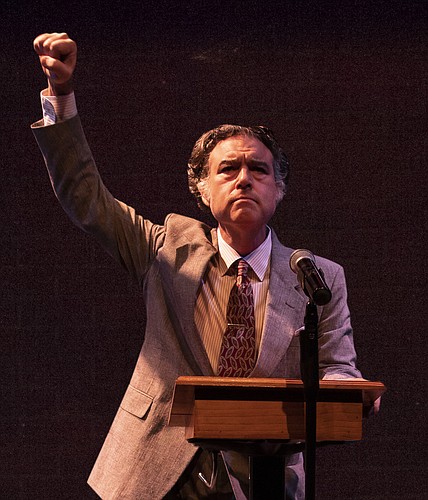- November 26, 2024
-
-
Loading

Loading

Are actors born or made? The answer is yes. Take Sam Mossler, for example. Acting’s in his blood. Watching him at work, it’s hard to imagine him doing anything else. During the day, he teaches acting to children and playwriting to adults at Florida Studio Theatre. At night, you might see him on an FST stage. Mossler’s recent productions include “How to Use a Knife,” “Other People’s Money,” and “The Nether.” Later this month, he’ll take the title role in Jeffrey Sweet’s “Kunstler.” Mossler’s doing what he was born to do. But he makes it clear that he doesn’t do it alone.
As a kid, did you think, “I’m going to be an actor when I grow up?”
As far back as I can remember. That wasn’t my only ambition, but it was one of them.
When did you get into acting classes?
I started at an FST summer camp at the age of 9. I kept taking classes at FST after that. I also enrolled in Booker High School’s VPA program with a concentration on theater. I learned a great deal there. For some strange reason, they usually cast me as an old man or a priest.
I understand you won the first year of FST’s “Write a Play” program.
Yes. That was back in 1991. I was still a high school freshman. My play was a beatnik musical titled, “Dating Tips from a Real Blowd in the Glass Cat.”
What was the prize for winning?
I got to see my play performed by professional actors — Brad Wallace, Doug Jones and Carolyn Michel. Watching them speak and perform my words on stage was incredibly inspiring. It encouraged my little boyhood ambitions.
Did you study acting in college?
Yes. I earned a BFA in acting at FSU in 1997 and continued my studies in London. After that, I moved to New York City for eight years, and to L.A. for eight more years. I had a lot of opportunities to fine-tune my craft in those cities.
Why’d you come back in 2016?
It’s easy to feel alienated and cast adrift in a big city, even if it’s culturally rich. I missed being part of a tight-knit theater community. That’s what brought me back.
How’d you reconnect with FST?
I got in touch with Christine Hopkins and Jason Cannon in the education program and resumed teaching. They opened up so many doors for me, and got me back in touch with the pulse of the theater. The next logical step was to audition for “How to Use a Knife.” I got the part and formed more great relationships. After that, I’ve been fortunate enough to be asked back for other roles. I’m a very lucky man.
Let’s talk about “Kunstler.” Have you immersed yourself in the character?
“Immersed” is definitely the right word. I’ve studied how Kunstler talks, how he thinks, and how he moves. I’ve snatched up every book he’s ever written. I got a copy of the October 1970 “Playboy” on eBay so I could read the interview. I’ve also studied every video I could find on YouTube, and watched Kunstler’s 1971 showdown with William Buckley 20 times. His daughters also did a documentary, “William Kunstler: Disturbing the Universe.” That was very, very helpful.
That sounds like hard work.
Yes and no. With “Kunstler” the memorization is pretty heavy — but there’s a flow to the show that’s easy to get into. Doyle, my character in “The Nether,” was much more demanding. I had to go to a very dark place to find him. It forced me into what I call “emotional fracking.” I had to dig deep into my personal experience — uncomfortable things, bad things.
Do you have a preferred approach to acting? A method to your madness?
It really depends on the role.
I understand you’re also a writer.
Yes. I’ve had some success as screenwriter. My screenplay for “Og’s Utopia” was a semifinalist in the Austin Film Festival a few years back. I also had a play produced off-Broadway. I haven’t hit the big time yet, but it’s something I really enjoy doing.
What do you do when writing and acting don’t pay the bills?
Things I don’t enjoy doing.
Did you find the theater community you were looking for in Sarasota?
Absolutely. FST is that community. They stick to their values, which haven’t changed since I was a little boy. So many nonprofits are really all about the profit. FST serves the greater community — and not in an obvious way. The shows are just the tip of the iceberg. There’s so much that people don’t see. FST reaches out to schools and they educate the next generation, which is how I got started. There’s also a circle of trust and friendship. Other theaters can get viciously competitive, but FST is always supportive. We all get by with a little help from our friends. That’s what brought me back. And that’s what keeps me here.